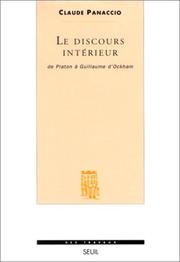| Listing 1 - 6 of 6 |
Sort by
|

ISBN: 2020358352 Year: 1999 Publisher: Paris Seuil
Abstract | Keywords | Export | Availability | Bookmark
 Loading...
Loading...Choose an application
- Reference Manager
- EndNote
- RefWorks (Direct export to RefWorks)
History of philosophy --- Theory of knowledge --- anno 500-1499 --- Antiquity --- Knowledge, Theory of --- Thought and thinking --- Philosophy, Ancient --- Philosophy, Medieval --- Théorie de la connaissance --- Pensée --- Philosophie ancienne --- Philosophie médiévale --- History --- Histoire --- Philosophie --- Linguistique cognitive --- Discours intérieur --- Concepts --- Knowledge, Theory --- -Language and logic --- -Mind --- Thinking --- Thoughts --- Educational psychology --- Philosophy --- Psychology --- Intellect --- Logic --- Perception --- Psycholinguistics --- Self --- Linguistics and logic --- Logic in language --- Language and languages --- Semantics --- Concept formation --- Abstraction --- -History --- Théorie de la connaissance --- Pensée --- Philosophie médiévale --- -Concept formation --- Mind --- Language and logic --- Argumentation --- Deduction (Logic) --- Deductive logic --- Dialectic (Logic) --- Logic, Deductive --- Science --- Reasoning --- Methodology --- Language and logic. --- Histoire.
Multi
ISSN: 16394216 ISBN: 9782711623785 2711623785 Year: 2012 Publisher: Paris: Vrin,
Abstract | Keywords | Export | Availability | Bookmark
 Loading...
Loading...Choose an application
- Reference Manager
- EndNote
- RefWorks (Direct export to RefWorks)
Le nominalisme, dans sa version la plus radicale, est l’idée qu’il n’existe dans la réalité que des êtres singuliers concrets et qu’il ne s’y trouve ni essences communes comme la nature humaine ou le genre animal, ni entités abstraites comme les nombres, les ensembles ou les valeurs. La généralité, dans cette optique, est une affaire de représentation qui s’explique par le fonctionnement du langage et de l’esprit. Des positions de ce type ont été défendues sous diverses formes dans l’histoire de la philosophie, principalement au Moyen Âge, à l’époque moderne et dans la philosophie analytique contemporaine. Ce recueil réunit sur la question des textes classiques de chacune des trois périodes
Nominalism --- Knowledge, Theory of --- Metaphysics --- Nominalisme --- Théorie de la connaissance --- Métaphysique --- Théorie de la connaissance --- Métaphysique
Book
ISBN: 1554429994 Year: 2005 Publisher: Chicoutimi : J.-M. Tremblay,
Abstract | Keywords | Export | Availability | Bookmark
 Loading...
Loading...Choose an application
- Reference Manager
- EndNote
- RefWorks (Direct export to RefWorks)
Book
ISBN: 1554428076 Year: 2004 Publisher: Chicoutimi : J.-M. Tremblay,
Abstract | Keywords | Export | Availability | Bookmark
 Loading...
Loading...Choose an application
- Reference Manager
- EndNote
- RefWorks (Direct export to RefWorks)
Knowledge, Sociology of. --- Knowledge, Sociology of --- History.
Book
ISSN: 17627184 ISBN: 9782711623396 2711623394 Year: 2011 Publisher: Paris: Vrin,
Abstract | Keywords | Export | Availability | Bookmark
 Loading...
Loading...Choose an application
- Reference Manager
- EndNote
- RefWorks (Direct export to RefWorks)
Qu'est-ce qu'un concept ? De quelle nature sont les unités de base de la pensée humaine ? Qu'est-ce que la représentation mentale. En vertu de quoi un concept représente-t-il certaines choses plutôt que d'autres ? Comment les concepts sont-ils liés au langage ?
Concept --- --Concept --- --Concepts. --- Knowledge, Theory of. --- Concepts.
Book
ISBN: 9783319666334 9783319666341 3319666339 3319666347 Year: 2018 Volume: 5 Publisher: New York : Springer,
Abstract | Keywords | Export | Availability | Bookmark
 Loading...
Loading...Choose an application
- Reference Manager
- EndNote
- RefWorks (Direct export to RefWorks)
This edited volume presents new lines of research dealing with the language of thought and its philosophical implications in the time of Ockham. It features more than 20 essays that also serve as a tribute to the ground-breaking work of a leading expert in late medieval philosophy: Claude Panaccio.Coverage addresses topics in the philosophy of mind and cognition (externalism, mental causation, resemblance, habits, sensory awareness, the psychology, illusion, representationalism), concepts (universal, transcendental, identity, syncategorematic), logic and language (definitions, syllogisms, modality, supposition,obligationes, etc.), action theory (belief, will, action), and more.A distinctive feature of this work is that it brings together contributions in both French and English, the two major research languages today on the main theme in question. It unites the most renowned specialists in the field as well as many of Claude Panaccio's former students who have engaged with his work over the years.In furthering this dialogue, the essays render key topics in fourteenth-century thought accessible to the contemporary philosophical community without being anachronistic or insensitive to the particularities of the medieval context. As a result, this book will appeal to a general population of philosophers and historians of philosophy with an interest in logic, philosophy of language, philosophy of mind, and metaphysics.
Philosophy, Medieval --- Philosophy of mind. --- Cognition. --- Mind, Philosophy of --- Mind, Theory of --- Theory of mind --- Philosophy --- Cognitive science --- Metaphysics --- Philosophical anthropology --- Panaccio, Claude, --- Psychology --- Philosophy of mind --- Language and languages --- Philosophy, Medieval. --- History --- Consciousness. --- Cognitive grammar. --- Logic. --- Linguistics --- Metaphysics. --- Philosophy of Mind. --- Cognitive Psychology. --- Cognitive Linguistics. --- Philosophy of Language. --- God --- Ontology --- Argumentation --- Deduction (Logic) --- Deductive logic --- Dialectic (Logic) --- Logic, Deductive --- Intellect --- Science --- Reasoning --- Thought and thinking --- Cognitive linguistics --- Grammar, Comparative and general --- Psycholinguistics --- Apperception --- Mind and body --- Perception --- Spirit --- Self --- Philosophy. --- Methodology --- Cognitive psychology. --- Language and languages—Philosophy. --- Psychology, Cognitive --- Psycholinguistics. --- Psycholinguistics and Cognitive Lingusitics. --- Language, Psychology of --- Psychology of language --- Speech --- Psychological aspects
| Listing 1 - 6 of 6 |
Sort by
|

 Search
Search Feedback
Feedback About UniCat
About UniCat  Help
Help News
News